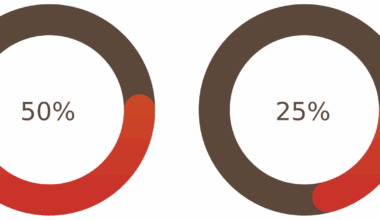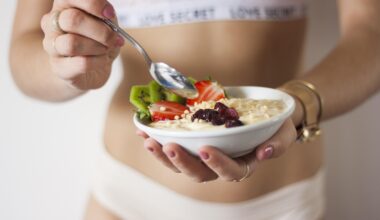Preventing Heat-Related Illness Through Proper Nutrition
For athletes, training and competing in hot environments can pose significant health risks. Heat-related illnesses, ranging from heat exhaustion to heat stroke, can occur if proper precautions are not taken. Nutrition plays a crucial role in the prevention of these illnesses. Preparing for workouts includes a focus on hydration and nutrient intake. Electrolytes, especially sodium and potassium, are essential in maintaining fluid balance. Insufficient hydration can lead to a decline in performance and serious health issues. Combining a balanced diet with fluid intake ensures optimal hydration levels. Carbohydrates and proteins are vital for energy provision and muscle recovery. Consuming high-water content foods, like fruits and vegetables, can contribute to hydration and overall caloric intake. Customizing nutrition plans based on climate and activity duration also enhances endurance and minimizes risks. Lastly, listen to your body’s signals to avoid overheating. Everyone must understand their own limits and adjust hydration and nutrition accordingly. Ultimately, education on nutrition and heat illness prevention strategies is vital for all athletes to thrive and perform under challenging environmental conditions.
Understanding Hydration Needs
Hydration is more than just drinking water; it involves understanding the body’s requirements during exercise and hot weather. Athletes should aim to replace fluid lost through sweating, which varies by individual reportedly from about 1 to 3 liters per hour. This variability makes personalized hydration strategies crucial. Establishing a hydration plan beforehand is essential for optimizing athletic performance. Consistently monitoring body weight before and after exercise can also give insight into hydration status. A loss of just two percent of body weight due to sweating can significantly impact physical performance. It’s important to include electrolytes in the hydration plan as well, since water losses can result in electrolyte imbalances leading to muscle cramps and other health issues. Sports drinks can be beneficial during long training sessions and competitions, as they often provide both fluids and necessary electrolytes. However, for shorter sessions, simple water often suffices. Also, consuming fluids before, during, and after exercise can form a comprehensive hydration strategy that prevents heat exhaustion or heat stroke in high temperatures. Thus, having a clear hydration plan is indispensable for every athlete.
Role of Nutritional Timing
Nutritional timing involves planning food intake around exercise schedules to maximize performance and recovery. For athletes training in high temperatures, timing is particularly crucial for maintaining hydration and energy levels. Consuming a carbohydrate-rich meal or snack about one to four hours before training can enhance performance and can be especially helpful in heat. After exercise, it’s vital to replenish not only the lost fluids but also macronutrients. A meal containing protein and carbohydrates within 30 minutes of finishing exercise can significantly aid in recovery, particularly in hot environments. This helps replenish glycogen stores while repairing any muscle damage sustained during intense workouts. Additionally, including small snacks rich in electrolytes post-exercise can facilitate faster rehydration. Choosing specific timing strategies allows athletes to optimize their body’s energy usage and recovery process, ensuring that they remain fueled and hydrated even under strenuous conditions. Ultimately, understanding the importance of when to consume food and fluids can lead to better performance and recovery in hot environments, reducing the risk of heat-related illnesses.
Incorporating specific foods into an athlete’s diet can significantly affect performance, particularly when competing in hot climates. Foods that are high in water content can aid in hydration, which is critical in hot weather. Fruits such as watermelon, oranges, and cucumbers not only help quench thirst but also provide essential vitamins and minerals. Green leafy vegetables, like spinach and kale, are also beneficial due to their high density of nutrients and water. Moreover, whole grains can provide sustained energy, which is especially important during prolonged exercise in heat. Nutrient-dense snacks, containing both carbohydrates and protein, should also be included in the pre-and post-workout meals. The relationship between nutrition and hydration cannot be overstated; they work together to support an athlete’s performance in heat. Additionally, specialized foods such as electrolyte gels can be used, particularly for endurance athletes, during long-duration events. The integration of these foods should be tailored to the athlete’s individual needs and environment. This ensures they are fully equipped to handle the challenges posed by exercising in heat, effectively preventing dehydration and heat-related illnesses.
Supplementation for Heat Resilience
With the increasing recognition of the importance of proper nutrition for athletes, dietary supplementation is becoming more common. For athletes training in hot conditions, certain supplements can potentially help in coping with heat stress. Electrolyte tablets can enhance hydration by providing minerals that are lost through sweat. Creatine, typically known for muscle building, may also support hydration within muscle cells. Additionally, beta-alanine supplementation can help combat fatigue in high temperatures by buffering acid in muscles. It’s essential to choose supplements that are backed by research and are safe for consumption. Consultation with a nutritionist or physician is advisable before beginning any supplementation regimen. However, natural food sources should be prioritized before turning to supplements. Proper nutrition should always stem from whole foods, as they provide more than just isolated nutrients. A balanced approach to dietary supplements should complement an athlete’s overall nutritional plan. Moreover, relying solely on supplements is often ineffective if they don’t address fundamental nutritional needs. This holistic view on supplementation can mean the difference between successful heat performance and potential adverse health effects.
Developing Personalized Nutrition Plans
Creating a personalized nutrition plan tailored for athletes training in hot environments can enhance performance while minimizing the risk of heat-related illnesses. This process begins with assessing individual hydration needs, dietary restrictions, and personal preferences. Each athlete’s sweat rate and composition can greatly influence the nutrition strategy. Utilizing hydration tests can pinpoint how much fluid and electrolytes an individual may need during workouts. Caloric requirements are also critical to consider, since athletes engaging in prolonged exercises in the heat may need increased energy intake. Incorporating varied and enjoyable foods keeps motivation high and encourages adherence to the nutrition plan. Regular assessments and adjustments to the nutrition plan are necessary to ensure that it continues to meet the athlete’s needs effectively. Furthermore, creating an adaptable plan enables athletes to respond to changing environmental conditions. This individualized approach not only promotes better hydration and nutrition but also empowers athletes to take control of their health and performance in hot climates. By prioritizing personalized strategies, athletes can thrive irrespective of the temperature, thus enjoying their sport while mitigating potential risks.
Finally, education on nutrition and heat-management strategies is essential for all athletes. Many athletes may not fully understand the impact of their diet on performance and heat-related health risks. It’s vital that sports organizations and coaches provide resources and training on these important topics. Workshops, seminars, and even one-on-one consultations can equip athletes with the necessary information to combat heat stress. For example, learning about recognizing signs of dehydration or heat exhaustion can be lifesaving. Additionally, practical guidance on meal planning in hot environments allows athletes to be proactive in their nutrition approach. Moreover, fostering a culture that emphasizes health and safety over performance alone can lead to better outcomes in training and competitions. Ultimately, a well-informed athlete is more likely to prioritize proper nutrition and hydration, which can mean the difference between success and serious health setbacks. Investing time and resources into education strategies not only ensures athlete safety but also promotes longevity in their sports careers. By making informed decisions, athletes can safeguard their health while striving to reach their full potential in athletics.


